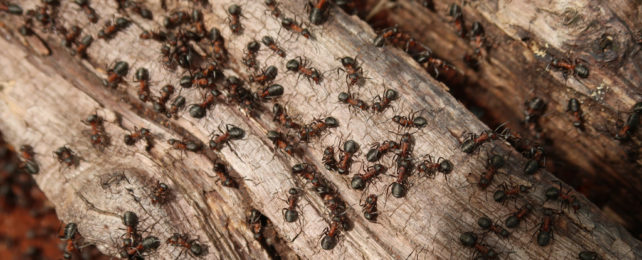In our homes, ants can be very annoying, especially when they have discovered sugary or protein-containing foods. Then there are veritable ant trails to the delicious food sources and control becomes urgently necessary. But what about outside – are ants in the garden also pests? And how can they be controlled naturally if necessary?
Contents
Ants in the garden are part of the ecosystem
When someone gets angry about ants, the anger usually refers to the black path ant (Lasius niger). This is the species most often found in the garden, in flower pots and on patios from March to October. And it is this species that is quite happy to wander into houses when looking for food – especially in spring.
The colony: a fascinating system
A colony can house over 10,000 workers. An ant nest is a fascinating system with an incredible order and division of labour. Each nest is usually home to only one queen, who can live for 20 years.
Ants in the garden offer many advantages
Ants play an important role in the ecosystem and fulfil many tasks. For example, the seeds of many wild plants are mainly spread by ants. They are also involved in loosening the soil and in the transformation of organic material, i.e. in the formation of humus. In addition, they serve as protein-rich food for numerous other animals.
Deter ants with natural means
Instead of relocation, you can use various measures to annoy the ants so much that they move voluntarily. There are some smells that confuse ants to such an extent that they can no longer find their way around. This is because ants orient themselves by pheromone-containing scents, which they emit themselves in order to find food sources as well as their own nest. Among the scents that irritate ants are vinegar, plant soaks and essential oils of various herbs and spices.
Yak
There are several different recipes for yak. Among the fermented plant yuks, a yuke made from wormwood or tansy is particularly helpful. Let 300 grams of fresh or 30 grams of dried herbs ferment in ten litres of water for a fortnight. Pour this slurry over the nest and ant trails several times.
Scents – from lavender to lemon
The scents of lemon peel, cinnamon, cloves, lavender and thyme are also helpful. Make a tea from them – 20 grams per six litres should be enough. Then strengthen this tea with five to ten drops of the matching essential oil. You should also spray this mixture over the nest and ant trails several times a week. This is best done in dry weather, as the scents quickly disappear after rain. Instead of a tea, you can also scent vinegar with essential oil and spray this mixture over the affected areas with a pump sprayer. The ants do not like the smell of tomato leaves either.
There are also commercial sprays that repel ants with the help of scents. However, these should not be confused with sprays that contain insecticides and thus kill ants and other insects.
Algal lime
A natural substance that ants also dislike is algal lime. Dust this regularly on the nests on dry days.
Fighting ants in the garden: please avoid cruel home remedies
Very often, home remedies are listed in the literature to kill the ants. These include, for example, baking powder mixed with icing sugar or fresh yeast mixed with honey. These home remedies lead to the agonising death of many workers, but the queen is not affected. The baking powder, for example, causes the ants to burst from the released carbon dioxide before they even reach the burrow. Moreover, such sweet attractants also attract other insects such as honey bees, wild bees and butterflies, which then face the same fate.
Also, the often touted method of pouring boiling water over the nests seldom hits the queen sitting deeper in the ground. Therefore, this variant only ensures a superficial massacre.


